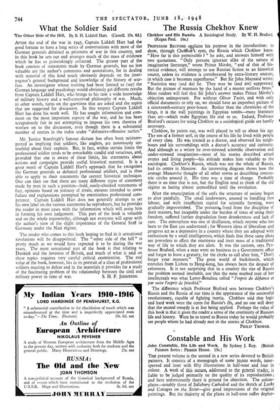The Russia Chekhov Knew
PROFESSOR BRUFORD eplains his purpose in the introduction: to show, through Cheldicar's eyes, the Russia which Chekhov knew. " How far is this permissible ? " he asks, and answers himself with two quotations. " Only persons ignorant alike of the nature of imaginative literature," wrote Prince Mirsky, " and of that of his- torical evidence, will attempt to use Russian fiction as an historical source, unless its evidence is corroborated by extra-literary sources, in which case it becomes superfluous." But Sir John Maynard wrote: " Statistics may (and do) lie. They may be (and are) suppressed. But the picture of manners by the hand of a master outlives brass." Most readers will feel that Sir John's answer makes Prince Mirsky's objection unimportant. For without Oliver Twist, and with only official documents to rely on, we should have an imperfect picture of a nineteenth-century poor-house. Rather than the chronicles of the kings, it is the wall paintings in Egyptian tombs—more literature than art—which make Egyptian life real to us. Indeed, Professor Bruford's excuses for using Chekhov as a sociological guide are hardly necessary.
Chekhov, he points out, was well placed to tell us about his age. The son of a former serf, in the course of his life he lived with people of every class. He was trained as a doctor, and observed his neigh- bours and his surroulidings with a doctor's accuracy and curiosity. And although as a writer he over-stressed scientific observation and under-stressed imagination—most of his stories described actual events and living people—his attitude makes him valuable to the sociologist. Chekhov's Russia, which was not the whole of Russia, had its centre in Moscow. An interesting diagram shows how the average Muscovite thought of all other towns as describing concen- tric circles around it. His time was a time of change. Probably there is no time that is not, but the English tend to think of the old regime as lasting almost unmodified until the revolution.
After the emancipation of the serfs the structure of society began to alter painfully. The small landowners, unused to handling free labour, and with insufficient capital for scientific farming, were gradually impoverished. The peasant. freed from the discipline of their masters, but incapable under the burden of taxes of using their freedom, suffered further degradation from drunkenness and lack of care. The atmosphere was one of disillusion, which anyone who has been to the East can understand ; for Western ideas of liberalism and progress act as a depressive in a country where they are adopted with enthusiasm by a small intelligentsia, which finds that these same ideas are powerless to affect the enormous and inert mass of a traditional way of life to which, they are alien. It was the custom, says Pro- fessor Bruford, when a man went on business to a Government office and forgot to leave a gratuity, for the clerks to call after him, " Don't forget your manners." The great world of backsheesh, which stretches from Lisbon to Hong-kong, has always been the despair of reformers. It is not surprising that in a country the size of Russia the problem seemed insoluble, nor that the most marked trait of her intellectuals was what Leroy-Beaulieu called " resprit de defiance et per suite resprit de frivolite."
The difference which Professor Bruford sees between Chekhov's Russia and the Russia of our time is the appearance of the successful revolutionary, capable of fighting inertia. Chekhov said that logic and hard work were the cures for Russia's ills, and no one will deny that the second remedy is at last being applied. Perhaps the value of this book is that it gives the reader a sense of the continuity of Russian life and history. Were he to travel to Russia today he would probably see people whom he had already met in the stories of Chekhov.
PHILIP TROWER.


































 Previous page
Previous page